Collective NounCollective nouns are titles for a group or a group of persons or things. Collective nouns include phrases like band, herd, and array. 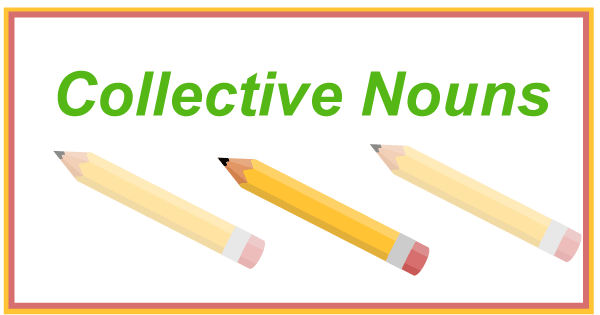
You may not realize it, but collective nouns are usually employed in regular routine. Collective nouns are terms for singular entities that contain more than one individual, animal, location, item, or idea. A group cannot be present without individualistic participants; however, we imply to a group as a singular body. Here, we'll look more closely at collective nouns and present even more instances, putting them in context to help you grasp how they operate. A collective noun is a term that implies to a group of individuals, animals, or a group of things overall. This is a type of noun that represents the majority of individuals or a group of persons, such as: 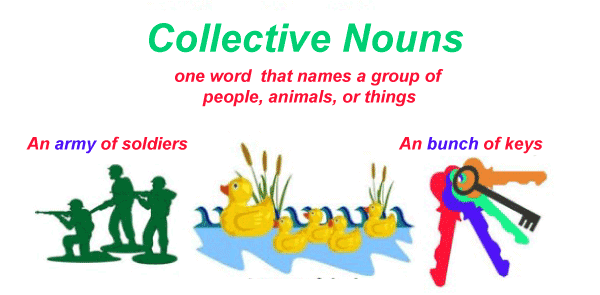
a group or a team (for instance: five football players) a family (for instance: mother, father, and two children) a crew (for instance: 100 sailors) Here are some other instances of collective nouns. As you can see, collective nouns can refer to a small group of people or a group of ten, hundred, or thousands of other people: a committee, a jury, a senate, a company, an audience, the police, and the army The majority of collective nouns pertain to individuals and groups. However, some also relate to animals or objects, for instance: animals: a herd of cattle, a flock of lamb items: a fleet of boats, a lorry convoy 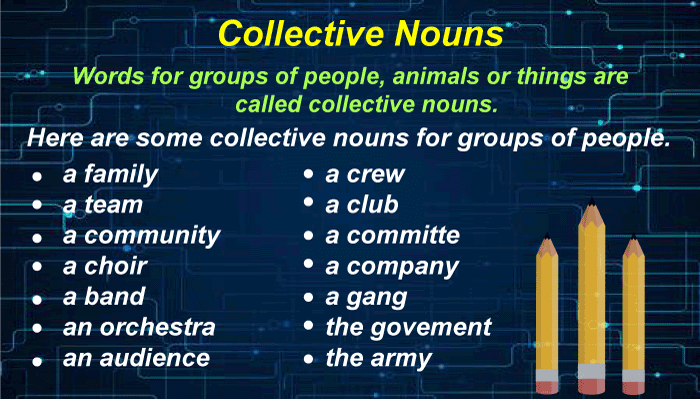
Correlation of Proper Noun and the Collective NounUsually, collective nouns are common nouns, but since they're the name of a firm or other entity with more than one individual, such as Microsoft, they could also be proper nouns. Here are some additional proper nouns that are collective nouns: Microsoft, Facebook, HBO, the BBC, the United Nations, UNESCO, Thai Air, Interpol, the FBI, Harvard University, and Manchester United are just a few of the firms operating. Is it a Collective Noun Plural or Singular?Each of the collective nouns listed above corresponds to a specific or a single "thing." However, it is made up of more than one individual. So, the concern is if a collective noun is singular or plural. This gets us to the reply: it varies. A collective noun can indeed be singular or plural, based on how the people in the grouping are seen. If you see the people behaving as a group, you presumably regard the collective noun as single (using a singular verb and singular pronoun), as in: The jury has given its verdict to the court. If you witness the individuals behaving separately, you will most likely regard the collective noun is plural (with plural verb and plural pronoun), as in: The jury has not concluded a decision since they are still debating amongst themself. To escape a logical contradiction, American English speakers could use a singular verb with the jury and reword the following sentence: The jury has not made a decision since its participants are still disagreeing with one another. Nevertheless, in American English, it is agreeable to utilize plural verbs if you want to stress the uniqueness of the collective noun individuals; you could use a plural verb. The California crowds were their customary assertive self. In American English, a plural pronoun can also be used along a singular verb, as in: The next-door household is really modest. We don't ever hear them. In all the forms, variety or types of English, the collective noun police is most often regarded as plural: The police are visiting The police were the initial to come. The police have signed their report. A collective noun might be - singular or pluralIn most circumstances, a collective noun can be pluralized. To put it another way, you could have more than one collective noun. In a football match, for instance, there are different teams. There are numerous households on the road. In such circumstances, a plural verb is employed automatically, as in the following examples: 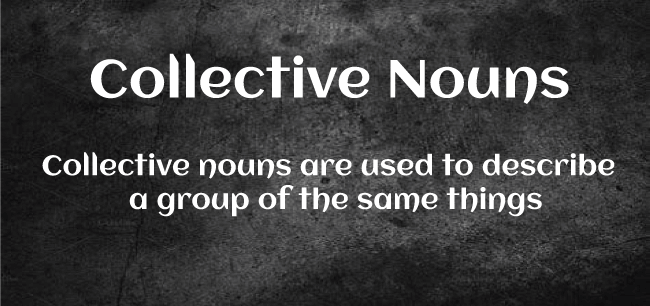
The many boats' crews in docks at the moment were literally battling. The two organizations have been bargaining for over two weeks. What if you can't seem to decide if a collective noun must be either singular or plural? To ensure that there is no agreement problem, you might create your statement with alternative words. For instance, you could use the word "members" rather than "team," "players" rather than "team," "zebras" rather than "herd," or "students" rather than "class." Reread what you've written to ensure that it seems natural, and allow yourself some practice time. You'll quickly be able to employ plural verbs without worrying about making errors. How to Make Use of Collective NounsWhen utilizing collective nouns, individuals who are novel to writing frequently struggle with sentence cohesion. This is logical given that a collective noun could be singular or plural based on the circumstances of a phrase. How can one comprehend that if a collective noun is singular or plural? How can one understand whether it's plural or not? Which pronouns and verbs work best with the collective noun you have selected? Here's a quick tip for determining how to utilize collective nouns in sentences: Consider a herd of zebras happily munching on the grassland. A lion leaps out of a cluster of long grass. What are the zebras up to? They attempt to flee away as a single pack, rushing over the grassland in almost the same route. People frequently react in the same manner, participating in a particular activity in tandem with everybody in their group. When people are members of a team, choirs, group, or just about any collective noun, that noun is single and is coupled with a singular pronoun and singular verb. As you examine the examples below, keep in mind that each person who is a part of a collective noun is performing the very same activity as others who are a component of that collective noun.
Assume you have three teenagers in your living room. Are they all doing the same exact thing? Unlikely! One is glued to the television. Another option is to read a novel while listening to songs. The third is looking at the TV with one eye at his computer with the other. There is indeed a single group of youngsters, yet each participant is doing something separately. Participants of collective noun can act similarly as an individual does on their own. Whenever individuals of a collective noun operate as people, the collective word becomes plural and must be associated with another collective noun. When participants of a collective noun act as an individual, the collective noun becomes plural and requires the use of plural pronouns and plural verbs. You'll note that the individuals of the collective noun aren't working in tandem as you study the examples below. After seven hours of sitting in the humid chamber, the jury relaxes, checks their phones, and makes their way to their automobiles for the ride back home. In this case, the jury is a plural collective noun. Relax and check are all plural verbs with a plural pronoun. The members of the jury are relaxing and checking their phones before departing in separate vehicles to their respective homes. After taking an exam, the class begins writing papers on Shakespeare's sonnets. In this case, class is now a plural collective noun. There is a plural pronoun and a plural verb in the beginning. . Despite being in the same class, the students will continue their respective papers on several sonnets penned by Shakespeare. Key Points to RememberUnless the situation emphasizes the people in the grouping, consider a collective word as singular. The choir isn't singing in tune. Due to the heat, the choir was falling. If you're not sure whether to regard a collective noun as single or plural, add a phrase like "members of" in front to make it appear as a plural. Due to the weather, members of the group fainted. Be constant across your phrase after you have determined if your collective noun is singular or plural. The group is altering its policy. The group are switching their clothing. By using "wrong" collective nouns as a creative writing method could be beneficial. a swarm of youngsters Most common collective nounTerms that express groups of animals, individuals, or objects are included in this list of frequent collective nouns. These terms are occasionally used interchangeably, and different writers frequently use them to express many things. For instance, the term swarm is often used to describe a swarm of bugs like ants, flies, or bees, but many authors use it to describe a large gathering of people. Once you've been acquainted with these terms, you'll realize that they're employed in a variety of contexts.
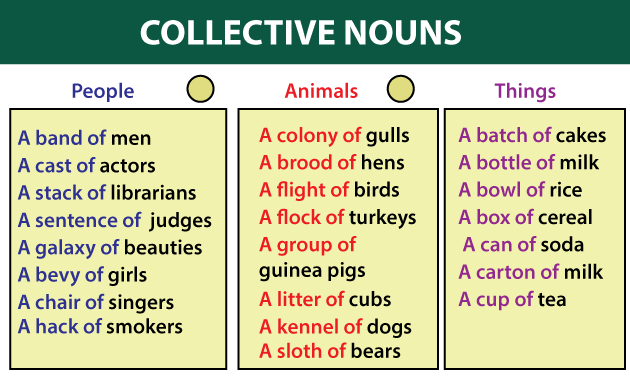
Examples of Collective Nouns in a sentence
Next TopicConcrete Noun
|
 For Videos Join Our Youtube Channel: Join Now
For Videos Join Our Youtube Channel: Join Now
Feedback
- Send your Feedback to [email protected]
Help Others, Please Share










